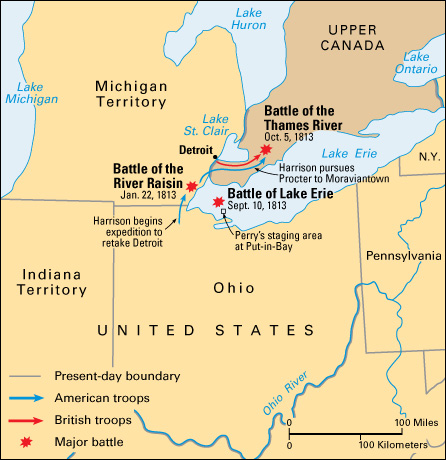River Raisin, Battle of the, was a battle in the War of 1812 (1812-1815). It took place in southeastern Michigan on Jan. 22, 1813. British Colonel Henry Procter (also spelled Proctor) led a force of about 1,100 British and indigenous (native) troops to victory over a smaller American force. The Americans, numbering more than 900, were led by Brigadier General James Winchester. After the battle, indigenous warriors massacred dozens of wounded American prisoners.
The Battle of the River Raisin gets its name from a river along the battlefield known as the River Raisin or the Raisin River. The battle is also called the Battle of Frenchtown, after the town where the battle was fought.
Background.
In July 1812, American troops under Brigadier General William Hull invaded Canada, the United Kingdom’s main possession in North America. The invasion was unsuccessful, and Hull soon retreated to Detroit. There, British Major General Sir Isaac Brock confronted Hull’s numerically superior forces. Brock bluffed the timid American general into surrendering Detroit and all American troops in the Territory of Michigan on August 16.
In September, the U.S. government instructed Major General William Henry Harrison, the newly appointed commander of the Army of the North West, to retake Detroit. In December, Harrison ordered Brigadier General James Winchester to station a group of soldiers on the Maumee River near present-day Perrysburg, Ohio. Winchester arrived in January 1813. He established a camp about 30 miles (50 kilometers) south of the town of Frenchtown (now Monroe, Michigan).

Inhabitants of Frenchtown soon urged Winchester to retake the town from the British and the Native Americans. At Frenchtown on January 18, more than 700 Americans defeated as many as 300 Canadian militiamen and warriors from the Potawatomi, Wyandot, and other indigenous nations. Two days later, Winchester and more than 250 additional soldiers reinforced the American position at Frenchtown.
The battle and massacre.
On January 22, Colonel Procter led about 1,100 troops in an attack on Frenchtown. Procter’s troops included British regulars, Canadian militia, and Native American forces. After a short fight, the approximately 400 Americans fighting outside the town on the right flank (side) were defeated. Many of them, including Winchester, were taken prisoner. The Americans on the left flank, positioned inside a low stockade (wooden fence) that protected the town, continued to fight off repeated British attacks.
As fighting continued, Procter convinced Winchester that the prisoners would be unharmed if the Americans surrendered. Winchester then ordered the remaining Americans to lay down their arms. The Americans reluctantly surrendered.
Procter, concerned that Harrison would attack with reinforcements, then withdrew to Canada. He took the able-bodied American prisoners with him. A number of wounded American prisoners remained at Frenchtown under a small British guard. The morning after the battle, Native American warriors returned to Frenchtown. Looking to avenge losses from the previous day’s battle, they killed about 30 wounded Americans.
The aftermath.
Over the course of the battle and massacre, more than 300 Americans were killed. About 500 were captured. The British reported 24 soldiers killed and 158 wounded. Native American losses were undetermined.
For eight months after the massacre, the British and Native Americans controlled Frenchtown. On Sept. 27, 1813, Kentucky Congressman Richard M. Johnson’s cavalry liberated the town. Johnson rallied his troops to the cry “Remember the Raisin.” About a week later, Johnson, with the same rallying cry, defeated Procter at the Battle of the Thames River (also called the Battle of Moraviantown) in present-day Kent County, Ontario.
River Raisin National Battlefield Park.
Today, the battlefield is preserved by the River Raisin National Battlefield Park in Monroe, Michigan. The park, which is operated by the National Park Service, opened to the public in 2010.
See also Brock, Sir Isaac ; Harrison, William Henry ; Hull, William ; Johnson, Richard Mentor ; Thames River, Battle of the ; War of 1812 .
